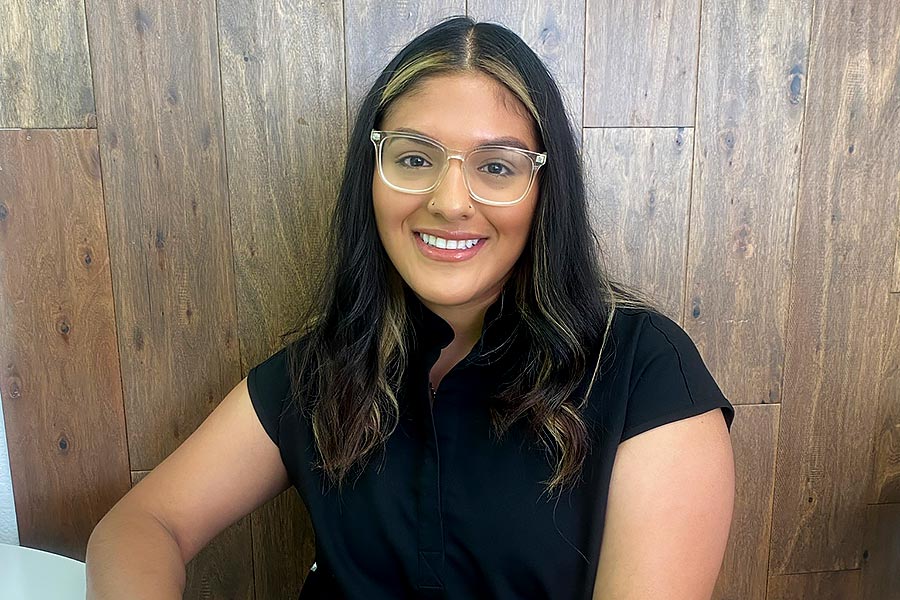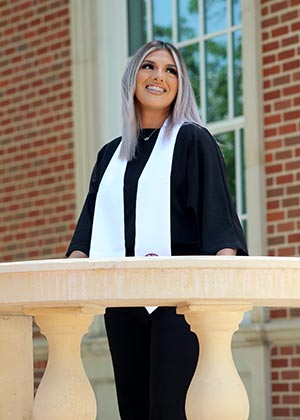Her calling is helping others find their voice

May 30, 2024 – DENTON – Growing up, Aracely Lomeli remembers seeing speech therapists come and go from her house. She knew they worked with her cousin who had autism but never attached a name to the profession.
It wasn’t until she was researching careers that involved helping children that she connected the profession to the women who had worked with her cousin.
Speech-Language Pathologist.
“I felt like this was my calling at the end of the day,” Lomeli said. “I just didn’t know there was an actual name for what I wanted to do.”
After graduating from Texas Woman’s with a Communication Sciences degree in May 2022, Lomeli stayed in Denton to work on her graduate degree in Speech-Language and Pathology with a goal of becoming a certified SLP. She plans on graduating in December 2024.
“I dived right in and I fell in love with the courses and I fell in love with the ability of giving someone their communication back,” said Lomeli. “Either with a kid who was installing this new skill they didn’t grow up with or working with an adult in which they had the communication but a traumatic experience happened and they lost their communication and now they are trying to regain it back.”
During the Spring 2024 semester, Lomeli did her first adult clinical rotation at the Mike A. Myers Stroke Center. The center provides outpatient treatment for people who have suffered strokes and traumatic brain injuries. Clients work individually with SLP graduate students, who are overseen by the department faculty (who are licensed speech-language pathologists).

Lomeli, who grew up in a Spanish-speaking household, is enhancing her degree by also working on a certification in bilingual SLP. This past spring was the first time that Lomeli worked with Spanish-speaking adult clients.
“I loved using my Spanish language at the Stroke Center,” Lomeli said. “As soon as I saw them come into therapy, I felt like I just saw a sense of relief in their faces. In the way, knowing that someone is going to understand them or share a similar background was going to take care of them. I really loved giving them that sense of comfort. And, I feel like even themselves or the caregivers would also debrief more with me and ask more questions. They were not as afraid to ask a question. It was definitely that sense of relief that I got from them that was really, really nice to see.”
Lomeli was always ready to step in when a translator was needed.
“I love being able to help translate and I know there is a definite need,” Lomeli said. “I feel like we are very short of bilingual therapists and we have a large population of Spanish-speaking patients. There is a great need out there and I am super happy to be part of that difference that will be made once I do graduate officially as a bilingual SLP.”
Lomeli had a unique opportunity in April to work with students in other disciplines at the Stroke Center Boot Camp, which is an annual interprofessional education event that involves SLP, occupational therapy, physical therapy and nursing students.
Lomeli and her group were assigned to a client who was Spanish-speaking so Lomeli was able to help translate for team members who were not fluent in Spanish.
“It was a very, very great experience,” Lomeli said. “I really loved collaborating with OT, PT and the nursing students. We were all one team developing a wellness plan for a client. I felt it was a great opportunity for everyone to learn about each profession and the purpose of the assessment that they do. Just because we all have the same goal for the client: to develop the wellness plan to make them feel more safe and have an overall healthier life after they experienced a stroke.”
Lomeli always planned to work with children as a career but is considering careers with other populations after working with adults at the center. She enjoyed having those everyday conversations with her clients as well as forming relationships with their caregivers.
“Toward the end, we did have our family conferences and I felt like this was very touching. Both of my Spanish-speaking clients teared up because they said they were afraid they wouldn’t meet someone like me again. I comforted them (saying),‘You are going to be taken great care of.’ But I feel like,-seeing that, it also gave me that realization, you are in this for a reason and you are making a great impact on these clients.”
Media Contact
Amy Ruggini
Digital Content Manager
940-898-3628
aruggini@twu.edu
Page last updated 9:38 AM, May 30, 2024